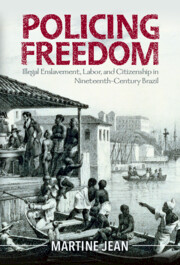Book contents
- Policing Freedom
- Afro-Latin America
- Policing Freedom
- Copyright page
- Dedication
- Contents
- Figures
- Maps
- Tables
- Acknowledgments
- Introduction
- 1 The Politics of Slavery, Race, Nation, and Prison Building
- 2 Confinement, Labor, and Citizenship
- 3 Prison Labor and the Politics of Slavery
- 4 Disciplining Children and Engendering Racialized Citizenship
- 5 Adelino Mwissicongo and the Afterlife of Emancipation
- Conclusion: Slavery’s Punitive Afterlife
- Appendices
- Bibliography
- Index
Conclusion: Slavery’s Punitive Afterlife
Published online by Cambridge University Press: 03 August 2023
- Policing Freedom
- Afro-Latin America
- Policing Freedom
- Copyright page
- Dedication
- Contents
- Figures
- Maps
- Tables
- Acknowledgments
- Introduction
- 1 The Politics of Slavery, Race, Nation, and Prison Building
- 2 Confinement, Labor, and Citizenship
- 3 Prison Labor and the Politics of Slavery
- 4 Disciplining Children and Engendering Racialized Citizenship
- 5 Adelino Mwissicongo and the Afterlife of Emancipation
- Conclusion: Slavery’s Punitive Afterlife
- Appendices
- Bibliography
- Index
Summary
The conclusion clarifies the main contribution of the book, which is the seamless transformation of Brazil’s ex-slaves into a captive and criminalized population in the country’s evolving prison system, which defined the terms of freedom for the enslaved and free poor at the height of the slave economy. The author invites the reader to remember the trajectory of different individuals who lived and died within the walls of the Casa de Correção as part of a microglobal history of slavery and punishment in the Atlantic World. The chapter reaffirms that by the time Brazil abolished slavery in its territory in 1888, a robust police and prison system was fully operationalized to punish unruly individuals from the poor, slave and free, especially people of African descent, who violated the terms of freedom. It asserts that the difference in the prison population before 1888 and after was only the diversity of legal status of the convicts during slavery, not race; and that the penitentiary was an important site of racialization of the multiethnic poor as a criminalized underclass.
Keywords
- Type
- Chapter
- Information
- Policing FreedomIllegal Enslavement, Labor, and Citizenship in Nineteenth-Century Brazil, pp. 288 - 296Publisher: Cambridge University PressPrint publication year: 2023

